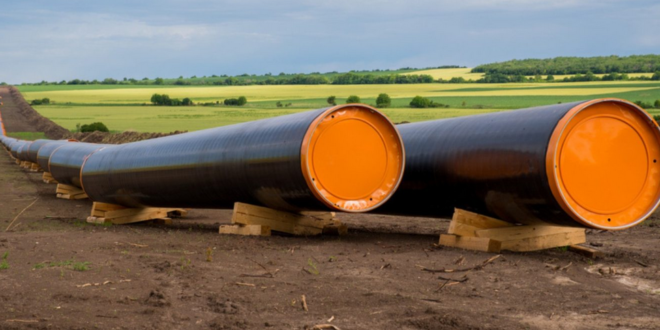The Bulgarian government will soon hold talks with its European partners about imposing a new tax on Russian gas transiting its territory, it was announced on Wednesday, a move that predictably angered Serbia and Hungary.
At the end of last week, Bulgaria imposed a special ‘energy tax’ of €10/MWh on Russian gas transiting through Bulgaria. As expected, this provoked strong reactions from Serbia and Hungary, which continue to import a large part of the blue fuel via the continuation of the Turk Stream gas pipeline through Bulgarian territory.
“We are about to hold the first talks with representatives of the European Commission, Hungary and Serbia. There is a European Council coming up, at which I will have the opportunity to talk with them. We say that this fee is for the Russian company Gazprom, not for these countries (Hungary and Serbia) or for (Bulgarian state company) Bulgartransgaz,” Prime Minister Nikolay Denkov said.
“This new Bulgarian regulation jeopardises the secure energy supply in Hungary and Serbia,” reads the joint statement of Serbian Finance Minister Siniša Mali and Hungarian Foreign Affairs and Trade Minister Péter Szijjártó.
The statement also notes that the European Union has not imposed sanctions on natural gas deliveries from Russia, making the Bulgarian Prime Minister’s argument entirely inaccurate.
Because of the tax, Russian gas from “Turk Stream” will increase by €100 per 1,000 cubic metrеs, which means 1/5 higher than the current market price. The question of who will pay the new fee has not yet been decided.
As Energy Expert Miloš Zdravković told Euractiv, the Bulgarian parliament and ruling coalition have exploited the geopolitical situation in Europe to top up their budget by sanctioning Russian gas and imposing a tax that will most affect Serbia and Hungary. He describes this as an unfriendly act.
“We will have a stable gas supply, but the price will be higher. This will affect the profitability of urban heating plants and industry. As of 1 November, we already have a planned 10% increase in gas prices, which will likely result in a 20% increase in bills,” says Zdravković.
Bulgaria expects at least €1.2 billion extra next year from gas transit and the new tax. Separately, Russia pays additional transit fees of just under €2 per MWh of gas transited through Bulgaria.
At the same time, Denkov explained that the government’s actions entirely favour “Bulgarian citizens, the Bulgarian economy and the national security of Bulgaria”.
The new energy tax on Russian gas was introduced with the special Bulgarian law on implementing sanctions against Russia due to the invasion of Ukraine.
Meanwhile, President Rumen Radev, whom opponents and Ukraine accuse of taking a pro-Russian stance, has sharply criticised the government for imposing the tax on Russian natural gas, adding that the fee destroys European solidarity in the case of Hungary and Serbia.
The president held positions very close to those of Hungarian Prime Minister Viktor Orbán while ruling Bulgaria through the caretaker government he appointed last year.
Radev did not support military aid to Ukraine, opposed admission to NATO, unlike other countries in the region, and often referred to the Russian invasion as a “conflict”, which are all things that infuriate Kyiv.
“What kind of European solidarity and integration are our rulers talking about, given that with the increase in transit fees for natural gas, they are affecting a country that is a member of the EU and our ally and partner, such as Hungary, which is also one of the main investors in Bulgaria? The neighbouring country is also affected – Serbia”, Radev said, commenting on the new transit fees for Russian gas.
In April 2022, Russia unilaterally decided to stop gas supplies to Bulgaria. At the time, there was no response from Sofia, and transit to other European countries was not preserved. The caretaker government of President Radev never filed a lawsuit against Gazprom for the suspended supplies.
 Eurasia Press & News
Eurasia Press & News




